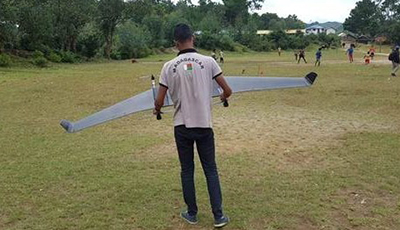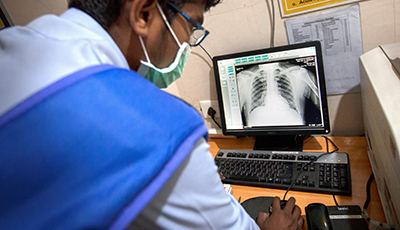21 April 2020 - TB is a centuries old disease and despite being curable the disease remains the biggest infectious disease killer. The world faces several challenges on its way to end TB, including finding all people who have TB, and providing proper treatment, among others. Stop TB Partnership’s TB REACH initiative has been on the forefront of funding projects that leverage innovation and creativity in tackling these challenges. This World Creativity and Innovation Day, check out some innovative projects, funded by TB REACH, that are paving the way for a world without TB. Check out here, the Flying Pharmacy, Artificial Intelligence tools, handheld X-rays, and an "island by Island" ending TB approach.
Innovation carries inherent risk, and TB REACH can support these innovative projects with the generous foundational support from Global Affairs Canada. Other donors to TB REACH include USAID, the Bill and Melinda Gates Foundation and the Indonesia Health Fund.
The Flying Pharmacy - Global Health Institute, Stony Brook Foundation (Madagascar)

Using innovative technology to find and treat people with TB, this flying pharmacy in Madagascar is re-imagining TB care. Between November 2017 and December 2018, with funding from TB REACH Stony Brook University (New York, USA) and Pasteur Institute of Madagascar conducted a pilot project to evaluate the feasibility of using Unmanned Aerial Vehicles (UAVs) to overcome the issue of poor transport links between TB patients and health centers in Madagascar. In this project ‘DrOTS- Drones Observed Therapy System in Remote Madagascar a drone is used to transport sputum samples and medication between a central laboratory in Ifanadiana town and the remote Androrangavola commune of the Ifanadiana district in the Vatovavy-Fitovinany region in south-central Madagascar. Walking, the only way to travel between these sites, can take patients many hours or even days to make the trip.
Drones can shorten the time it takes for samples to reach the laboratory. Due to the infrastructure limitations of the village concerned, an autonomous drone capable of bi-directional transport, not requiring a launcher or runway to take flight, was required for this project. The experiences and lessons learned from this pilot project in Madagascar were shared with TB REACH grantees in Nepal and help them implement a successful drone project.
The Stop TB Partnership is currently working on a drone implementation guide with case studies to help illustrate the obstacles, in past and ongoing drone projects, solutions as well as a recommended implementation timeline are presented. The guide is expected to be published in 2020.
Reaching zero TB, one island at a time - The Regents of the University of California, San Francisco (Marshall Islands) and CTY TNHH IRD VN (Viet Nam)

TB REACH supported two different active case finding projects with a comprehensive strategy to find and treat both active TB disease and TB infection to move towards the ambitious goal of ending TB. One project was conducted on Majuro Island by the Republic of the Marshall Islands and the other in Vietnam on Cu Lao Cham and Cat Ba Islands. Both projects involved mass screening and community mobilization, resulting in more than 3000 people being treated for infection and TB disease.
Using Artificial Intelligence (AI) to find and treat TB - PATH (India)

Currently, TB REACH supports PATH to combine the use of two novel diagnostic tools, Artificial Intelligence and TrueNat, to accelerate TB screening and diagnosis in the private and informal provider sector in India. Artificial Intelligence can provide automated chest x-ray reading and TrueNat is a new molecular test that can diagnosis TB disease and rifampin resistance in one hour. Results from this ongoing project will provide key learnings on how to best implement and incorporate innovative tools in the fight against TB in the private sector.
Combining ground-breaking tools to address TB in children - Centre for Infectious Disease Research in Zambia

TB REACH is supporting the exploration and evaluation of novel screening and diagnostic tools in the fight against childhood TB. CIDRZ in Zambia is testing out the use of a handheld x-ray camera, AI for reading pediatric chest x-rays, and is evaluating the use of the FujiLAM diagnostic test in childhood active TB case finding efforts. Results from this project will provide valuable information of the performance of these tools in children.
